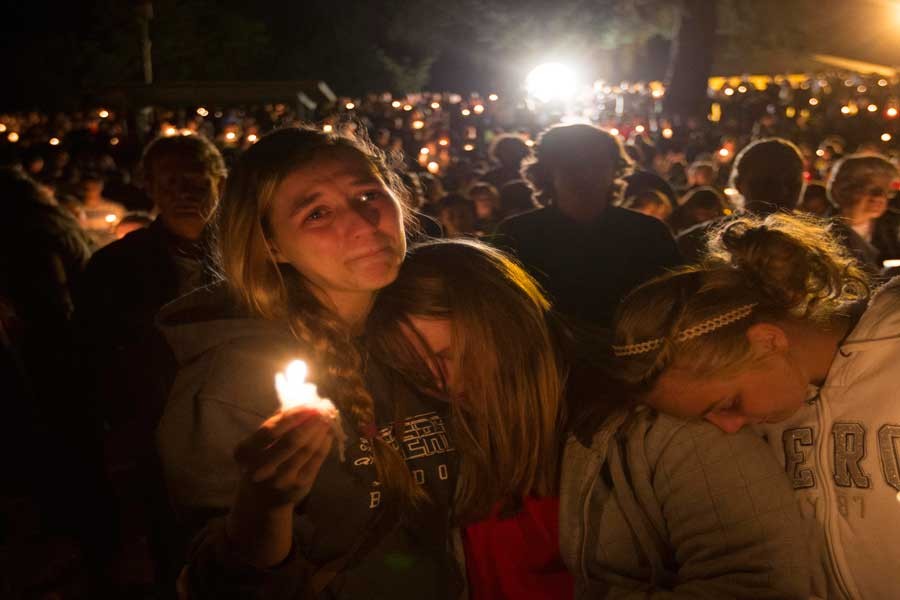Oregon shooting impacts JC
Photo courtesy Chris Pietsch/The Register-Guard/Zuma Press/TNS
A group of young women console each other during a vigil on Oct. 1, 2015 in Roseburg, Ore. after a shooter opened fire at the Umpqua Community College, killing several.
On Oct. 1, 26-year-old Christopher Harper-Mercer killed 10 people and injured seven before turning the gun on himself. These 17 people were added to rising list of victims killed or injured by school shootings when another mass shooting occurred at Umpqua Community College (UCC) in Roseburg, Oregon.
Although all school shooting scenarios are horrible, this one had a unique impact on social studies teacher Robert Schick.
Schick attended the small community college in Oregon where the shooter killed all of his victims. “I didn’t want to find out about the shooter, and I’ve never felt that way before,” Schick said.
Schick recognized his college UCC when he saw the footage of the shooting. “When they were showing the footage on television, the school actually looked really similar to when I was there a long time ago. There are certain signs that were precisely the same. When they talked about how it took place at Snyder Hall […] that was where I had my English classes. I took Shakespeare classes there and English Composition. I had some awesome teachers that I spent time after school with, in Snyder Hall talking to them, so it was just, it was weird,” said Schick.
However, the images Schick saw don’t fit with his happy memories of his time at the school. “I see the building looking just like it used to, but in the photo, you see people being wheeled out on stretchers. You see EMTs running around madly because they can’t keep up with the carnage. You see SWAT team members running around with guns drawn […] that’s certainly not how I remember it,” Schick said.
Schick graduated high school in Chicago, Illinois, moved to Oregon, and joined the workforce. At age 20, he decided to put himself through college. With an affordable price, UCC was the clear choice.
“Community college was the way to go and certainly more affordable than jumping right into the University of Oregon,” Schick said.
Events like school shootings and bombings have always affected Schick. The Boston Marathon Bombing event happening three days after visiting his daughter’s, at that time, prospective school Emerson College in Boston, Massachusetts.
“I was surprised at the time that my first reaction wasn’t just, ‘Well you’re not going there! What an obviously terrible and dangerous place,’” Schick said. “I think we both realized that it was just a very random occurrence. It could have been virtually anywhere.”
Schick believes that our society is becoming more and more desensitized to these shootings. “One might not even be able to remember and come up with the name of where this latest shooting took place a week from now. Obviously, I’ll never forget because I have that actual connection, but I can’t come up with what the previous three or four mass shootings were in this country. They’ve become commonplace. And that’s part of the tragedy,” Schick said.
The damage done by these shootings goes beyond the physical. According to Everytown, a pro-gun regulation group, there have been approximately 150 mass shootings since 2013.
This averages almost one shooting a week. Colleges and high schools nationwide feel a direct impact from these shootings and are reacting to prevent these threats, for example, practicing lockdown drills in high schools.
Despite the impact on their schools, many students appear to be uninformed of the large number of school shootings. The Patriot approached several JC students to find out if they had heard about any recent shootings.
“[I have heard of] none,” one freshman said.
Other students were less sure of their response. “I know one, but I forgot the name. I think I heard [about] one months ago,” a senior said.
When asked what they knew about the shooting at UCC, students’ responses were vague. “A good bit of people died and a good bit of people [were] injured,” one sophomore said .
The students knew even less about how many shootings had occurred in the past few years. “I think maybe 3,” the senior said.
A possible reason for this lack of knowledge could be that students prefer to be isolated from the violence. “I don’t like hearing about them. It’s awful,” the sophomore said.
Schick agrees, but he knows that isolating oneself from the violence is not the answer.
Despite the odds, Schick remains hopeful for the future. “I would like to think that we really do have real ways of preventing these things. America is an awesome country, and we have been up against problems before in our history that seemed insurmountable that we’ve solved. We have a lot of really smart people who can come up with creative ways to solve those problems,” Schick said.
Student sources were named by year level to preserve the anonymity of their responses to The Patriot’s survey questions.
Joe Kyburz is a Copy Editor and Kelly Foulk is a News Editor for The Patriot and jcpatriot.com.



